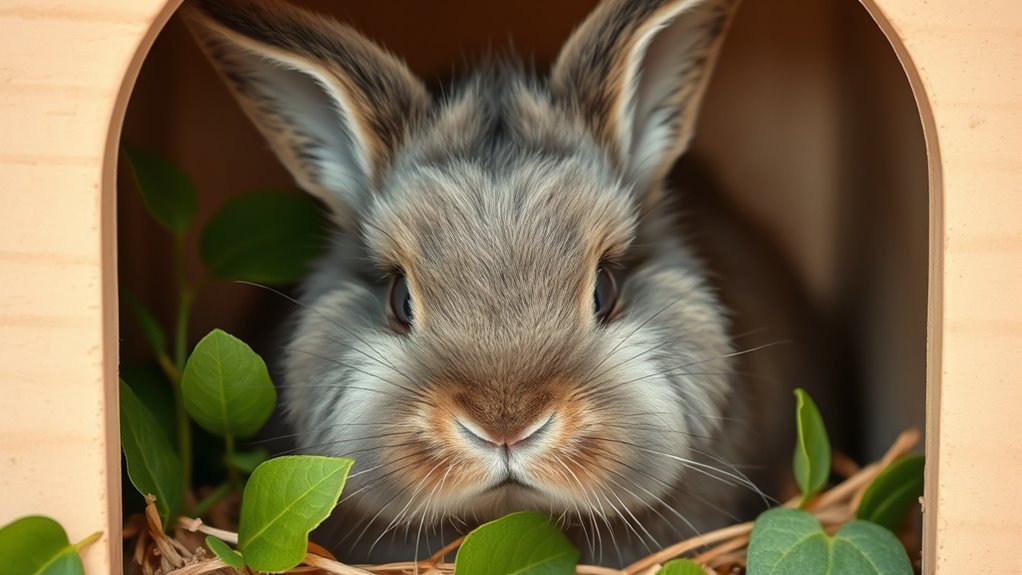Caring for your first rabbit involves feeding them hay, fresh greens, and controlled pellets, while always offering fresh water. Regular grooming, including brushing, nail trims, and ear checks, keeps them comfortable and healthy. Create a spacious, quiet environment with hiding spots and toys for mental and physical stimulation. Consistent care and attention to their diet, grooming, and health needs help guarantee a happy bunny. Keep exploring to learn how to give your rabbit the best life possible.
Key Takeaways
- Provide a spacious, clean habitat with hiding spots and toys to promote mental and physical stimulation.
- Feed a diet of unlimited hay, fresh vegetables, controlled pellets, and fresh water daily.
- Regularly groom your rabbit based on coat length, including brushing, nail trimming, and ear checks.
- Ensure consistent daily interaction and bonding to support social behavior and emotional well-being.
- Monitor health by checking teeth, nails, ears, and overall condition, and visit a veterinarian for routine care.

Have you ever wondered what makes rabbits such popular pets? It’s their gentle nature, adorable appearance, and relatively easy care. But to keep your bunny happy and healthy, you need to understand their specific needs, especially when it comes to diet tips and grooming routines. Rabbits are herbivores, so their diet should mainly consist of hay, fresh vegetables, and a controlled amount of pellets. High-quality hay, such as timothy or orchard grass, is essential because it helps with digestion and keeps their teeth worn down, which is indispensable since their teeth grow continuously. Fresh greens like romaine lettuce, cilantro, and parsley can be given daily, but avoid iceberg lettuce and sugary vegetables that can upset their digestion. Providing fresh water at all times is equally imperative. When planning your rabbit’s diet, remember that treats should be limited, and always avoid human foods like bread or chocolate, which can be toxic.
Grooming routines are equally pivotal for your rabbit’s well-being. Regular grooming helps prevent matting, reduces shedding, and allows you to check for any signs of health issues like skin infections or parasites. Depending on your rabbit’s breed and coat length, grooming frequency may vary. Long-haired breeds such as Angoras need daily brushing to keep their fur tangle-free, while short-haired rabbits might only require weekly brushing. Use a soft-bristled brush or a comb designed for small animals, and be gentle to avoid stressing your bunny. Besides brushing, routine nail trims are necessary because overgrown nails can cause discomfort or even injury. You can trim their nails using small pet nail clippers, but if you’re unsure, your vet can show you how. Regularly check their ears for wax buildup or signs of infection, and keep their living space clean to prevent any skin problems or infections.
In addition to diet tips and grooming routines, paying attention to your rabbit’s environment and social needs will guarantee a well-rounded care routine. Provide a spacious, clean, and quiet habitat with plenty of hiding spots and toys to keep your bunny stimulated. Spend time bonding with your rabbit daily, as they are social creatures that thrive on interaction. Proper care involves consistency and attentiveness—by sticking to a balanced diet, maintaining good grooming routines, and offering a safe space, you set the foundation for a happy, healthy companion. Remember, caring for a rabbit isn’t just about meeting their basic needs; it’s about understanding their unique personality and giving them a life full of comfort and love.
Frequently Asked Questions
How Long Do Rabbits Typically Live?
You might wonder about the typical rabbit lifespan, especially as you care for aging rabbits. Generally, rabbits live around 8 to 12 years, though some can reach 14 or more with proper care. As your rabbits age, you’ll notice changes, but a healthy diet, regular vet visits, and a safe environment can help prolong their lifespan. Keep an eye on their health to ensure they enjoy a happy, long life.
Can Rabbits Be Trained to Use a Litter Box?
You can definitely train your rabbit to use a litter box through consistent litter box training and understanding rabbit behavior training. Start by placing a litter box in a favorite spot and encouraging your bunny to use it. Reward good behavior with treats and patience, as rabbits quickly learn where to go. With regular practice, your bunny will develop good habits and make caring for them much easier.
What Are the Signs of a Healthy Rabbit?
A healthy rabbit shines like a well-tuned instrument. You’ll notice bright eyes, a clean, shiny coat, and steady energy levels. Their appetite should be consistent, with proper digestion evident in firm droppings. Good nutrition tips include fresh hay and vegetables, while grooming essentials keep their coat free of mats. If your rabbit shows these signs, you’re on the right track—your little companion is thriving and happy.
Are Rabbits Good Pets for Small Children?
Rabbits can be good pets for small children if you prioritize child safety and understand rabbit socialization. You need to supervise interactions, teach your child gentle handling, and make certain the rabbit is comfortable. Rabbits are social animals that thrive with gentle, consistent contact, but they can become stressed or scared if mishandled. With proper supervision and care, rabbits can become affectionate companions for your child.
How Much Space Does a Rabbit Need to Thrive?
Bouncing bunnies need plenty of space to thrive. You should provide a cage with generous dimensions—at least 4 feet by 2 feet—so they can comfortably hop and hide. An outdoor enclosure is ideal for daily playtime, offering fresh air and freedom. Remember, more space means happier, healthier rabbits. So, prioritize spaciousness to provide your bunny with a balanced, beneficial environment for bouncing, burrowing, and basking.
Conclusion
So, after everything you’ve learned, remember that caring for a rabbit isn’t just about cuddles and cute photos. It’s about patience, commitment, and understanding that these adorable creatures have their own needs and quirks. Ironically, what seems like simple fun can turn into a full-time job. But if you’re ready to embrace the responsibility, your bunny will reward you with loyalty and love—proof that sometimes, the smallest creatures teach us the biggest lessons.









